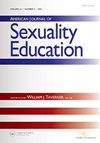A Systematic Review of Individual, Psychological and Sociocultural Factors Associated with Safe and Risky Sexual Behavior in Older Adults
IF 1.1
Q2 EDUCATION & EDUCATIONAL RESEARCH
引用次数: 6
Abstract
Abstract The incidence of sexually transmitted infections (STIs) in older adults has increased with sexual intercourse being the most common mode of transmission. This demonstrates their participation in risky sexual behaviors. The objective of this systematic review was to determine the individual, psychological, and sociocultural factors associated with the use or nonuse of condoms for vaginal, oral, or anal intercourse and having one or multiple sexual partners in older adults. Primary research articles with correlational designs that identify an association between some individual, psychological, or sociocultural factors with the use or nonuse of condoms for vaginal, oral, or anal intercourse or with monogamous or non-monogamous relationships in older adults were included. Some of the variables associated with safe and risky sexual behaviors were the power of sexual decision-making, self-silencing, the importance of sex, income, frequency of sex, education, and social capital. The literature regarding factors associated with safe and risky sexual behaviors in older adults is scarce and represents an area of opportunity for future research.与老年人安全性和危险性行为相关的个体、心理和社会文化因素的系统综述
摘要老年人性传播感染(STIs)的发病率有所上升,性交是最常见的传播方式。这表明他们参与了危险的性行为。这项系统综述的目的是确定与使用或不使用避孕套进行阴道、口腔或肛门性交以及在老年人中有一个或多个性伴侣相关的个人、心理和社会文化因素。纳入了具有相关设计的初步研究文章,这些文章确定了一些个人、心理或社会文化因素与使用或不使用避孕套进行阴道、口腔或肛门性交,或与老年人的一夫一妻制或非一夫一夫制关系之间的关联。与安全和危险性行为相关的一些变量包括性决策的权力、自我沉默、性的重要性、收入、性行为的频率、教育和社会资本。关于老年人安全和危险性行为相关因素的文献很少,这是未来研究的一个机会领域。
本文章由计算机程序翻译,如有差异,请以英文原文为准。
求助全文
约1分钟内获得全文
求助全文
来源期刊

American Journal of Sexuality Education
EDUCATION & EDUCATIONAL RESEARCH-
CiteScore
2.40
自引率
8.30%
发文量
39
期刊介绍:
The American Journal of Sexuality Education speaks directly to the distinct, professional needs of sexuality educators and trainers. This peer-reviewed journal provides sexuality educators and trainers with current research about sexuality education programming, best practices, sample lesson plans, reports on curriculum development and assessment, literature reviews, scholarly commentary, educational program reports, media reviews (books, videos, internet resources, and curricula), and letters to the editor. The American Journal of Sexuality Education addresses a variety of sexuality topics and audiences, presenting up-to-date theory and practice, lessons, and evaluations.
 求助内容:
求助内容: 应助结果提醒方式:
应助结果提醒方式:


